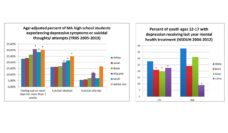In the United States, women who have children before the age of 25 tend to have lower socioeconomic status and education attainment than those who start families in their 30s and 40s. A recent New York Times article reported that “the differences in when women start families are a symptom of the nation’s inequality–and as moving up the economic ladder has become harder, mothers’ circumstances could have a bigger effect on their children’s futures.” Younger mothers are less likely to have stable employment or jobs that require college and graduate degrees, making it difficult to provide for their children. These challenges are exacerbated when financially struggling mothers have children with psychiatric disorders.
The Genetic Psychiatric Cohort (GPC) study collected clinical and demographic data on patients with mental health disorders and their children from Los Angeles County/University of Southern California and SUNY Downstate Medical Centers between 2007 and 2017. Our research team analyzed GPC data from Los Angeles and Brooklyn for associations between childhood schizophrenia and bipolor disorder and race, poverty, and maternal age. We found that pediatric, African-American patients with bipolar disorder and schizophrenia tend to grow up with younger mothers than their White counterparts. Considering the adverse socioeconomic consequences of younger motherhood, this means that Black youth with psychiatric disorders may have less access to appropriate mental health care.
Our findings show that urgent action is needed to fight the ongoing mental health care crisis in our country, including efforts to expand mental health care among all racial and ethnic groups.
While previous studies have suggested that Black mothers are three years younger on average than White mothers, it was unknown whether similar results would hold true with a cohort of bipolar and schizophrenic patients. We found that a higher percentage of Black patients in this study had younger mothers at birth. Fifty-six percent of African American bipolar patients grew up with mothers between the ages of 14 and 25, compared to 40% of White patients. Fifty-four percent of African-American schizophrenia patients grew up with younger mothers, compared to 43% of White patients. Younger motherhood was correlated with bipolar disorder and schizophrenia among African-American patients.
Local and state governments must ensure that mental health care is accessible for minority groups living in urban areas. Our findings show that urgent action is needed to fight the ongoing mental health care crisis in our country, including efforts to expand mental health care among all racial and ethnic groups.
Photo by freestocks.org on Unsplash















